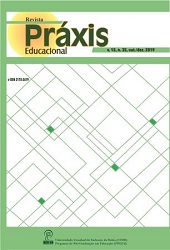DIDACTIC EXPERIENCES IN ARCHITECTURE AND URBANISM DEGREES: BY MOVEMENTS OF INCORPORATION
DOI:
https://doi.org/10.22481/praxisedu.v15i35.5674Keywords:
Architecture and urbanism, Formation, IncorporatedAbstract
This work consists in presenting three didactic experiments carried out within the Faculty of Architecture and Urbanism of the Federal University of Juiz de Fora, where students were immersed in environments other than those of classrooms. These experiments, developed along the path of the
action-research methodology, sought to privilege the students' contact with situations that made them reflect on the beings and things that conform the environments in which they were and, to a certain extent, establish relations with them, paying special attention to the dynamics provoked by these beings and things and how in them they intertwine each other in the daily life of cities. The discussions with the students during these experiences, their return in the form of narratives and the observation of the complexification of their speeches and actions along with the academic activities that we were able to accompany, encouraged the proposition of a doctoral thesis with the Post- degree in Architecture and Urban Planning from the Federal Univ ersity of Bahia. Both in this thesis and in this article, we advocate the adoption of changes in the teaching of Brazilian Architecture and Urbanism graduations based on paradigmatic references other than Cartesian: "Complex Thought", "Philosophy of Difference", "Biology of Knowing" "Education of Attention", all aimed at valuing "Experience" in the world. The intention is that the formation of these students enables the construction of subjectivities close to what we call "embodied posture", more consonant, in our view, with the complexity of this world as a whole.
Downloads
Downloads
Published
Issue
Section
License
Você é livre para:
Compartilhar - copia e redistribui o material em qualquer meio ou formato; Adapte - remixe, transforme e construa a partir do material para qualquer propósito, mesmo comercialmente. Esta licença é aceitável para Obras Culturais Livres. O licenciante não pode revogar essas liberdades, desde que você siga os termos da licença.
Sob os seguintes termos:
Atribuição - você deve dar o crédito apropriado, fornecer um link para a licença e indicar se alguma alteração foi feita. Você pode fazer isso de qualquer maneira razoável, mas não de uma forma que sugira que você ou seu uso seja aprovado pelo licenciante.
Não há restrições adicionais - Você não pode aplicar termos legais ou medidas tecnológicas que restrinjam legalmente outros para fazer qualquer uso permitido pela licença.












